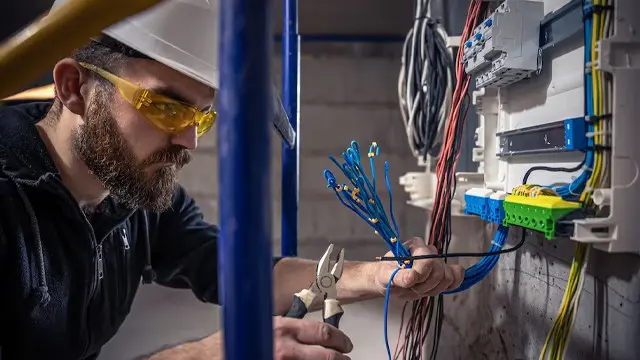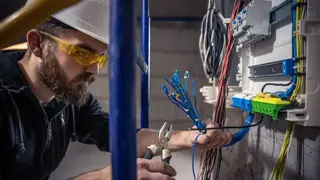
Electrical Wiring Training
Updated study materials |* Free Certificate *|* Designed by Industry Experts *| Instant Access | 24/7 Support
Course Line On Demand
Summary
- Reed Courses Certificate of Completion - Free
- Tutor is available to students
Add to basket or enquire
Overview
Welcome to Electrical Wiring Training, a comprehensive and engaging course designed to provide you with in-depth knowledge and practical skills in Electrical. Throughout this course, we will explore various aspects of Electrical and delve into its fundamental concepts, advanced techniques, and real-world applications.
Our primary objective in Electrical Wiring Training is to equip you with a solid foundation in Electrical. Whether you are a beginner or an experienced professional looking to expand your expertise, this course will cater to your needs and help you achieve your learning goals.
During our journey together, you will have the opportunity to:
- Gain a thorough understanding of the core principles and theories that underpin Electrical.
- Acquire practical skills through hands-on exercises, projects, and real-world examples.
- Explore cutting-edge advancements and emerging trends in the field of Electrical.
- Prepare for future opportunities, such as further education, career advancement, or entrepreneurship, in the field of Electrical.
- Reflect on your learning journey, celebrate your achievements, and gain the confidence to excel in Electrical.
By the end of Electrical Wiring Training, you will have gained a comprehensive understanding of Electrical and developed the skills necessary to succeed in this dynamic field. Whether you choose to pursue further education, enter the job market, or embark on entrepreneurial ventures, this course will lay a strong foundation for your future endeavours.
We are excited to have you join us on this educational journey, and we look forward to helping you unlock your full potential in Electrical Wiring Training. Let's get started!
Why should you choose Course Line?
When it comes to quality education and professional development, Course Line stands out as one of the most prestigious learning providers. As a certified institution by UKRLP & CPD Group, we have a proven track record of excellence, having successfully taught over 20,000+ students and counting.
Curriculum
-
Module 1: Basics of Electrical Wiring 05:00
-
Module 2: The UK Generation, Transmission, And Distribution-System. 02:00
-
Module 3: Basic Electronics You Should Know 08:00
-
Module 4: Residential Electrical Wiring Procedures 02:00
-
Module 5: Switches 03:00
-
Module 6: Designing Electrical Services 06:00
-
Module 7: Tools for Quality Electrical Operations 07:00
-
Module 8: Recommended Techniques for Quality Electrical Work 02:00
-
Module 9: Light Installation 03:00
-
Module 10: Avoiding Shock Hazards 04:00
-
Module 11: Mitigating the Hazards 04:00
-
Module 12: Appliances Repairing and Maintenance 05:00
-
Module 13: Electrical Hazards 05:00
-
Module 14: Colour TVs 03:00
-
Module 15: Grounding 07:00
-
Module 16: Electromagnetism 09:00
-
Module 17: Electrical Conduits 09:00
-
Module 18: Temporary Power Installations 06:00
-
Module 19: Electric Panels and Switchboards 05:00
-
Module 20: Cable and Wire Pulling Techniques 02:00
-
Module 21: Electrical Inspection And Testing 03:00
-
Module 22: Types of Cables and Wires 10:00
-
Module 23: Capacitors 04:00
-
Module 24: Transformers 09:00
-
Module 25: Storage Batteries 03:00
-
Module 26: Aluminum and its alloys 06:00
-
Module 27: The Importance of Backup Power 05:00
-
Module 28: Sustainable Power Systems 06:00
-
Module 29: USB Cables 02:00
-
Module 30: Telephone Work 03:00
Course media
Description
Welcome to the course outline for Electrical Wiring Training. In this comprehensive learning journey, we will explore the depths of Electrical, delving into its core principles, practical examples, and advanced techniques. Through a series of engaging lectures and exercises, you will gain the knowledge and skills necessary to excel in the field of Electrical Wiring Training.
*****Electrical Wiring Training Course Syllabus*****
Module 1: Basics of Electrical Wiring
- Household Wire Gauge
- Types of Household Wires
- Basic Connections
Module 2: The UK Generation, Transmission, And Distribution-System.
- How is Electricity Generated?
- How is Electricity Transmitted?
- How is Electricity Distributed?
Module 3: Basic Electronics You Should Know
- Knowledge about Basic Components
- Breadboarding
- Drawing Schematics
- Soldering
- De-Soldering Tools
- Using a Multimeter
- Hot glue guns
- Liquid electrical tape
- Testing
- Working with wires
- Power Source of the project
- Ensuring safety
Module 4: Residential Electrical Wiring Procedures
- Residential Electrical Wiring Procedures
- Load calculation
- Place your concealed conduit PVC pipes in position
- Colour coding of wires
- Passing wires through the pipes
- Earthing
- Fixing the switchboard
Module 5: Switches
- Main Switches
- Installation of Main Switches
- Wall Sockets
Module 6: Designing Electrical Services
- Electrical Systems Design
- The electrical design flow
- Generative design: The heart of a model-based approach
- Optimizing variants, complexity and cost
Module 7: Tools for Quality Electrical Operations
- Electrical Operation Tools
- Types of wire strippers
- Insulated screwdrivers
- Insulated pliers
- Electrical tape
- Hacksaws
- Cable cutters
- Spanners
- Voltage tester
- Safety knife
- Hex keys
- Claw Hammer
- Chisel
- Torch
Module 8: Recommended Techniques for Quality Electrical Work
- Know What Tools to Use
- Understand Good Technique
- Stay Safe While Working
- Master Basic Projects
Module 9: Light Installation
- Installing a Light Fixture
Module 10: Avoiding Shock Hazards
- Avoiding electrical shocks
Module 11: Mitigating the Hazards
- What is Hazard Mitigation?
- Types of Mitigation Techniques
- Common Mitigation Actions
- Hazard Mitigation Plan Revision Process
Module 12: Appliances Repairing and Maintenance
- Clean Refrigerator Coils
- Avoid Overloads
- Recalibrate Your Oven Temperature Setting
- Keep It Quiet
- Keep the Dishwasher Clean
- Clean Window Air Conditioners in Spring
- Remember the Magic Button
- Clean Up Stove Spills
- Fight Stinky Fridge Syndrome
- Electric Stove Burners Need Good Contact
- Clean Fridge Gaskets
- Clean Out Disposer Crud
- Heat Up a Lukewarm Dryer
Module 13: Electrical Hazards
- Dangers of electricity
- How to prevent electrical hazard accidents
- Take electrical risk assessments
- Train safe workers
- Good electrical safety management
Module 14: Colour TVs
- Fixing TV Color Problems
Module 15: Grounding
- What is Grounding?
- Is the Ground a Conductor of Electricity?
- System Grounding
- Neutral Grounding
- Other Grounding Methods
- Equipment and Safety Grounding
- Bonding Equipment for Meeting Safety Standards
- Protecting Against Static Electricity with Static Grounding
- Lightning Protection Grounding
- Protecting Against Lightning-Induced Overvoltages
- Grounding Techniques for Protecting Electronic Equipment
- Grounding Techniques and Uses
Module 16: Electromagnetism
- Applications of Electromagnetism
Module 17: Electrical Conduits
- Electrical Conduits
- Metallic Conduits
- Non-Metallic Conduits
- Conduit Fittings
- Conduit Bodies
- Bends
- Coupling
- Drains
- Bushings and Locknuts
- Unions
- Nipples and Hubs
- Reducers and Reducing Washers
- Straps and Clamps
Module 18: Temporary Power Installations
- Temporary Power Installations
- Immediate versus planned
- Limited time versus ongoing
- Connected versus stand alone
- Connected versus stand alone
- Mobile versus fixed
- Rented versus owned
- Finite versus additive
Module 19: Electric Panels and Switchboards
- What is an electrical panel?
- How to locate your panel
- How does an electrical panel work?
- Role of an Electric Switchboard
- Types of Electric switchboards
- Electrical Supply to the Board
Module 20: Cable and Wire Pulling Techniques
- Cable and Wire Pulling Techniques
Module 21: Electrical Inspection And Testing
- Routine Check Guide
- Electrical Inspection and Testing Procedures
- The Electrical Installation Condition Report
- Maintaining Electrical Systems
Module 22: Types of Cables and Wires
- Types of Cables and Wires
Module 23: Capacitors
- What is Capacitor?
- How Capacitor Works
- Capacitor Dielectric Working Principle
- Capacitor Applications
Module 24: Transformers
- What are Electric Transformers?
- How Do Electric Transformers Work?
- Components of Electric Transformers
Module 25: Storage Batteries
- What is battery storage?
- Why is battery storage important and what are its benefits?
- How exactly does a battery storage system work?
- What renewable energy storage systems are being developed?
Module 26: Aluminum and its alloys
- Aluminum and its alloys
- Aluminum applications
- Cable
- Overhead lines
- Engines
- Sheet windings
Module 27: The Importance of Backup Power
- Facilities and Power Losses
- Blackouts and Power Outages
- Get a Backup Power Plan in Place
Module 28: Sustainable Power Systems
- What is Sustainable Energy and Why Do We Need It?
- What is sustainable energy?
- What is the difference between sustainable and renewable energy?
- What are the benefits of sustainable energy?
- Why is sustainable energy important for our future?
Module 29: USB Cables
- What is a USB Cable?
Module 30: Telephone Work
- How Telephones Work
- Telephones: Wires and Cables
- Digital Phone Calls
Assessment Process
Upon completing the Electrical Wiring Training course, you will be required to undertake a multiple-choice evaluation in order to gauge your understanding of the material covered.
If you do not achieve the minimum passing score, you will have the opportunity to retake the assessment without incurring any additional cost.
Certification
After successfully completing this Electrical Wiring Training course, you will get an instant Free digital certificate.
Who is this course for?
Electrical Wiring Training is designed to cater to a wide range of individuals who are eager to enhance their knowledge and skills in Electrical.
This course is suitable for:
- Beginners in Electrical
- Professionals
- Students
- Career changers
No matter your background or level of experience, Electrical Wiring Training offers a comprehensive learning experience that caters to your specific needs. Join us on this educational journey and unlock your potential in Electrical today!
Requirements
Requirements for the Electrical Wiring Training course:
- No Prior Knowledge Required
- Basic Computer Skills.
- Internet access.
- Familiarity with English
Career path
Completing Electrical Wiring Training course can open exciting career opportunities in various fields related to Electrical. Here are three potential career paths you can pursue after completing Electrical Wiring Training:
- Panel Wirer
- Electrician
- Electrical Technician
- Electrical Fitter
- Electrical Test & Inspection Engineer
Questions and answers
Currently there are no Q&As for this course. Be the first to ask a question.
Certificates
Reed Courses Certificate of Completion
Digital certificate - Included
Will be downloadable when all lectures have been completed.
Reviews
Currently there are no reviews for this course. Be the first to leave a review.
Legal information
This course is advertised on reed.co.uk by the Course Provider, whose terms and conditions apply. Purchases are made directly from the Course Provider, and as such, content and materials are supplied by the Course Provider directly. Reed is acting as agent and not reseller in relation to this course. Reed's only responsibility is to facilitate your payment for the course. It is your responsibility to review and agree to the Course Provider's terms and conditions and satisfy yourself as to the suitability of the course you intend to purchase. Reed will not have any responsibility for the content of the course and/or associated materials.


